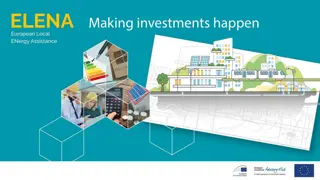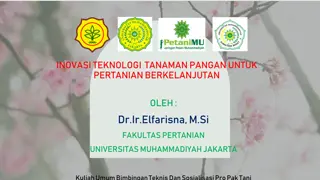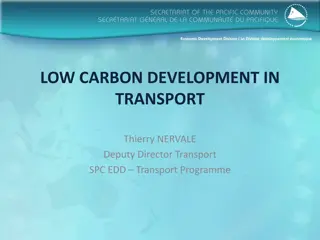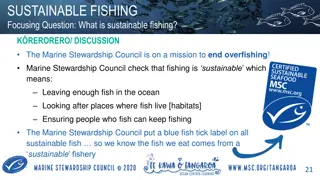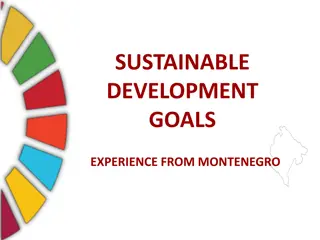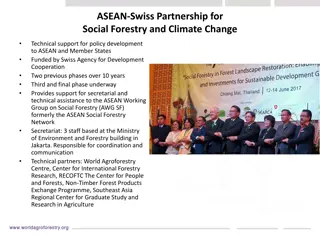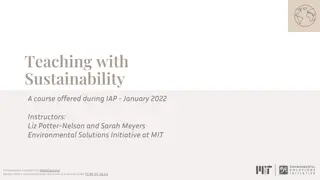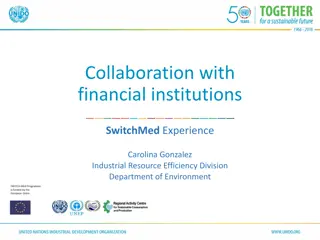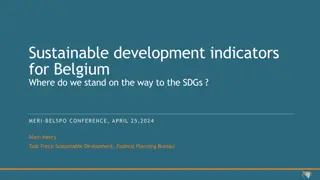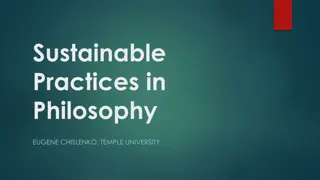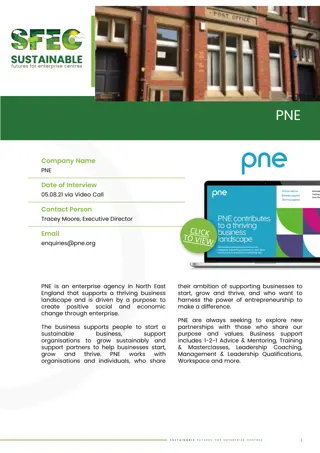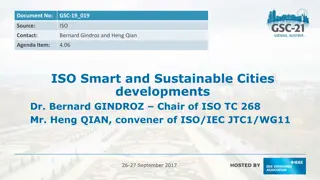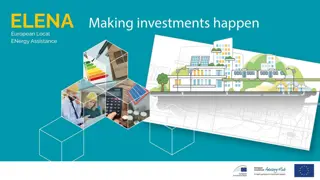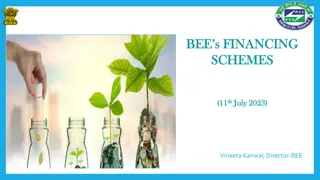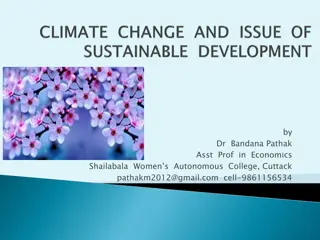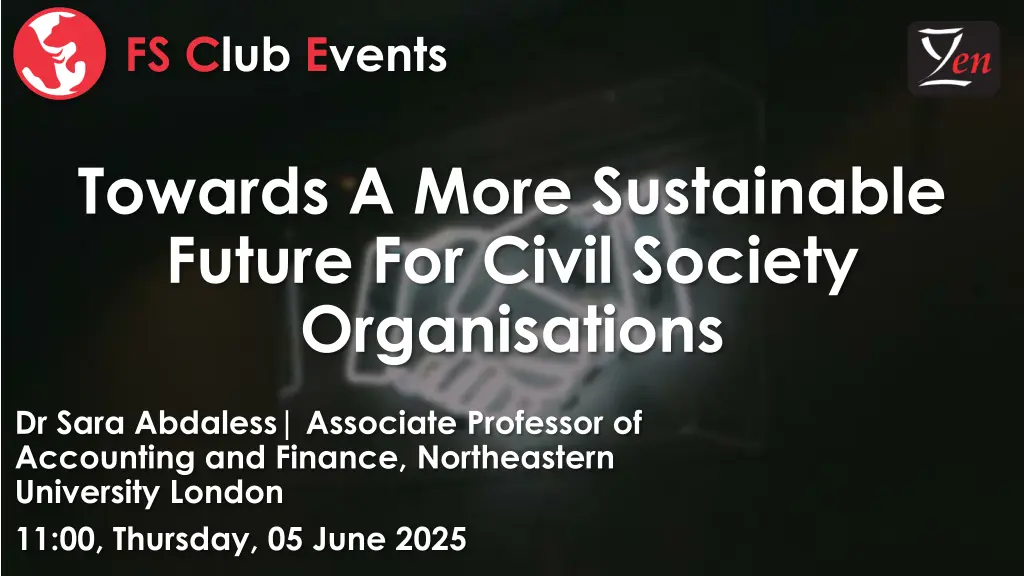
Effective Collaboration for Sustainable Civil Society
Discover the crucial role of effective collaboration between civil society organizations (CSOs) and trade unions in creating a more sustainable future. Dr. Sara Abdaless, an Associate Professor of Accounting and Finance from Northeastern University London, sheds light on this topic. Find out how research funded by the British Academy aims to enhance collaboration for the betterment of society.
Download Presentation

Please find below an Image/Link to download the presentation.
The content on the website is provided AS IS for your information and personal use only. It may not be sold, licensed, or shared on other websites without obtaining consent from the author. If you encounter any issues during the download, it is possible that the publisher has removed the file from their server.
You are allowed to download the files provided on this website for personal or commercial use, subject to the condition that they are used lawfully. All files are the property of their respective owners.
The content on the website is provided AS IS for your information and personal use only. It may not be sold, licensed, or shared on other websites without obtaining consent from the author.
E N D
Presentation Transcript
FS Club Events Towards A More Sustainable Future For Civil Society Organisations Dr Sara Abdaless| Associate Professor of Accounting and Finance, Northeastern University London 11:00, Thursday, 05 June 2025
Platinum Sponsor Gold Sponsor Silver Sponsor Bronze Sponsor Contributor Sponsor
FS Club Events A Word From Our Chairman Ian Harris Director Z/Yen Group
FS Club Events Today s Agenda 11:00 - 11:05 Chairman s Introduction 11:05 - 11:25 Keynote Presentation - Dr Sara Abdaless 11:25 - 11:45 Question & Answer
FS Club Events Today s Speaker Dr Sara Abdaless Associate Professor of Accounting and Finance Northeastern University London
Towards A More Sustainable Future For Civil Society Organisations The Role Of Effective Collaboration Between CSOs & Trade Unions Dr Sara Abdaless (Northeastern University London)
The project investigating collaboration The project is investigating collaborations between civil society organisations (CSOs) (charities, advocacy, campaigning organisations etc) and trade unions A key aim of the project is to ascertain what makes collaboration effective, with a view to finding ways of improving collaboration The research is funded in part by a grant from the British Academy and forms part of an academic research project being jointly undertaken by Dr Sara Abdaless (Northeastern University London), Dr Mike Rigby (London South Bank University) and Dr Steve Williams (University of 2 Portsmouth).
Literature Context I Civil Society the space outside the family, market and the state embracing organizations including NGOs, Trade Unions, Social Movements, grassroot/local organizations, faith groups, online networks and communities Importance of Civil Society for the maintenance of strong democracies- role of intermediary organizations in providing avenues for the voices of members of society to be heard. Contemporary concern about the health of civil society the weakness of intermediary organizations at a time when the insecurity and challenges faced by societies are increasing e.g climate change, inequalities, military threats. (Bond, 2019, Daly and Howell, 2006, Putnam, 2000, Van Dyck, 2017)
Literature Context II Examples of challenges faced by two major elements of Civil Society: NGOs Dependence on government funding and implications for autonomy and resourcing in periods of austerity; the COVID pandemic; increased scrutiny in respect of governance, transparency and accountability; threats to levels of volunteering. Trade Unions - membership decline e.g.from 55% density in 1979 to 24% in 2020, decline in bargaining coverage (ONS, 2021), reduction in influence upon government. (Forest and Popplewell, 2012, Hargrave, 2021, Milbourne and Murray, 2017, Preston, 2022)
Literature Context III Given the challenges faced, there has been an increasing number of advocates of collaboration between these different elements of Civil Society. Among the benefits of collaboration have been suggested reaching a wider audience and more volunteers /members; sharing of services, expertise and resources; greater legitimacy ;more effective campaigning; greater influence of the policies of government and government agencies. Potential obstacles union organization in NGOs; different values and cultures of the two sectors; Political sensitivity of relations with trade unions; resourcing. (Antenas Colladream, 2008, Eade, 2004, Gallin, 2000, Heery et al, 2018 and Tizard, 2017)
Literature Context IV Existing literature on collaboration between the two sectors is extremely limited and suggested a space that needed filling. Emphasis in existent literature on limited local, often single-issue collaborations, sometimes in a development context (Tattersall, 2010, Wills and Simms, 2016, and Garcia Cal via and Rigby, 2022)
Methods and Data 3 Stage process: 15 Preliminary interviews with key informants and stakeholders from trade unions and civil society (2022-23) 84 responses to the survey were obtained: 50 from third sector organizations and 34 from trade unions. Typically, responses were from policy officers of the organizations. In relation to collaboration, it was made clear to respondents that the focus was not upon collaboration in collective bargaining. (November 2023 February 2024): Report on survey findings sent to research participants (March 2024) 23 Interviews based on 12 cases of collaboration identified (May 2024 July 2024) 3
Methods and Data (2) Snowball Sampling Support of key organizations beforehand e.g interviews with TUC and NCVO Asked in the survey for commitment re co-operation in next stage Referrals from initial interviews to contacts in collaborating institutions Used direct contact via email and through Linkedin. Most effort in following up to increase survey response, particularly in relation to the Charities Qualitative Thematic Analysis and Framework Analysis
Case number Organisations involved in collaboration Nature of collaboration The National Union of Rail, Maritime and Transport Workers Royal National Institute of Blind People. The Pharmacists Defence Association Parkinsons UK Unison Joint Council for the Welfare of Immigrants National Association of Probation Officers The Travellers Movement Union of Shop Distributive and Allied Workers Child Poverty Action Group Unite the Union Prostate Cancer UK Trades Union Congress Migrant Rights Network Equality Trust Maternity Action National Education Union Public and Commercial Services Union Friends of the Earth Trades Union Congress Friends of the Earth Greener Jobs Alliance Climate Justice Coalition Campaign to prevent the closure of rail ticket offices Case 1 Campaign to provide free medication in the case of serious long-term illness Case 2 Establishment of a help line for migrant workers Case 3 Development of a toolkit to ensure improved presentencing reports for travellers Identification of problematic cases of the application of Universal Credit and guidance for its actual/potential recipients. Increasing the awareness of workers of the risk of prostate cancer and providing negotiating guidelines to union representatives in this area Providing training for union representatives on the problems and issues of migrant workers Development of a toolkit on equal pay for union representatives. Provision of training and advice to union representatives on maternity issues Case 4 Case 5 Case 6 Case 7 Case 8 Case 9 Case 10 Promoting a just transition at work Greening jobs and the economy Case 11 Mobilizing for climate justice Case 12
Key findings (1) CSOs are generally positive about trade unions and quite a lot of support exists for closer relations with them A significant minority of CSOs (40%) collaborate with unions on an ongoing basis Most trade unions claim to have a good relationship with CSOs, see collaboration with them as important and something they would like to extend Current areas of collaboration include: equal rights; civil/political rights; health; education & training; poverty/welfare; climate change and migrant rights 4
Key findings (2) Key benefits of collaboration for CSOs and trade unions: Supporting campaigns and enhancing campaigning activity Being better able to influence government policy (lobbying) Ability to access and share knowledge and expertise 6
Key findings (3) For trade unions, collaboration is inhibited by: lack of time; a lack of knowledge of CSOs; and, to a lesser extent, by the experience and perceptions of the collective bargaining relationship For CSOs, the main barriers to the development of collaboration are: lack of time; lack of knowledge of unions; unions not considered important enough 8
15 Guidelines for effective collaboration (1) 1. Deciding upon the appropriate form of collaboration 2. Recognizing and articulating common interests 3. Skills and knowledge 4. Taking advantage of the legitimacy brought by each partner to the collaboration 5. Exploiting the political leverage of partners 6. Upholding worker interests including job security 7. Identifying the most important methods of collaboration 19
15 Guidelines for effective collaboration (2) 8. Building and sustaining effective relationships between individuals in the collaboration 9. Managing effectively the resources available 10.Mutual understanding 11.Identifying and exploiting successes 12.Recognizing the possible tension between collective bargaining and collaborations 13.Establishing the data required to support collaborations 14.Identifying the appropriate organizational level for the operation of collaboration 15.Mapping out and facilitating future opportunities for collaboration 20
Conclusion and next steps In the current socio-economic climate, effective collaboration between elements of Civil Society is more important than ever. Effective collaboration between Tus and CSOs is achieving greater social, economic and environmental justice. The guidelines serve as an enabler to those civil society organizations exploring and looking to embark on a collaboration. Although, the guidelines were created with CSOs and TUs in mind, the principles remain applicable to other types of collaborations, including between the private sector and third sector. Next steps: A Toolkit for collaboration Comparative study between UK and Spain with Professor Dr Miguel ngel Garcia Calavia from the University of Valencia
THANK YOU sara.abdaless@nulondon.ac.uk
FS Club Events Comments, Questions & Answers
Platinum Sponsor Gold Sponsor Silver Sponsor Bronze Sponsor Contributor Sponsor
FS Club Events FS Club Events Forthcoming Events Thursday, 05 June 2025 (13:30 - 19:00 BST) Employee Share Plans Symposium 2025 Wednesday, 18 June 2025 (11:00 - 11:45 BST)Esop Sofa: 2025 AGMs, Remuneration Policies And Share Plan Design Tuesday, 01 July 2025 (18:00 - 20:00 BST) FS Club Summer Mixer - Can AI Survive Regulation? https://fsclub.zyen.com/events/forthcoming-events/ Visit: https://fsclub.zyen.com/events/forthcoming-events/ https://www.youtube.com/zyengroup Watch past webinars: https://www.youtube.com/zyengroup


